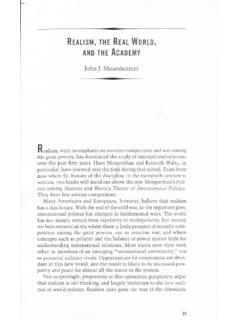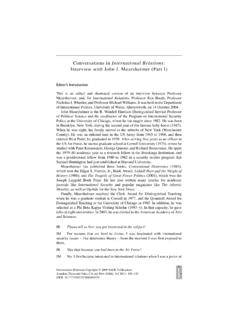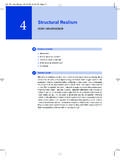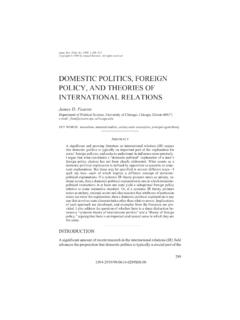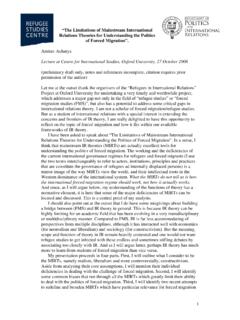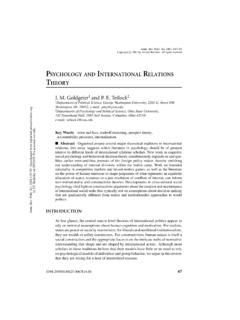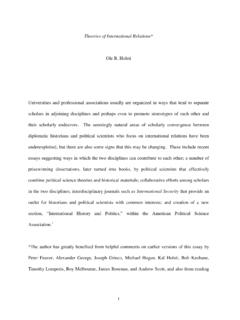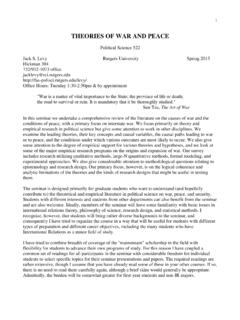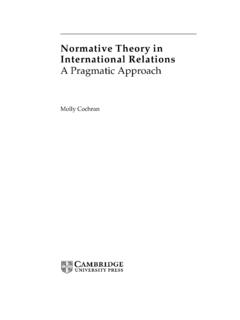Transcription of EJ IR - John J. Mearsheimer - Home Page
1 European Journal of international Relations19(3) 427 457 The Author(s) 2013 Reprints and permissions: : theory behind: Why simplistic hypothesis testing is bad for international RelationsJohn J. MearsheimerUniversity of Chicago, USAS tephen M. WaltHarvard University, USAA bstractTheory creating and hypothesis testing are both critical components of social science, but the former is ultimately more important. Yet, in recent years, international relations scholars have devoted less effort to creating and refining theories or using theory to guide empirical research.
2 Instead, they increasingly focus on simplistic hypothesis testing, which emphasizes discovering well-verified empirical regularities. Privileging simplistic hypothesis testing is a mistake, however, because insufficient attention to theory leads to misspecified empirical models or misleading measures of key concepts. In addition, the poor quality of much of the data in international relations makes it less likely that these efforts will produce cumulative knowledge. This shift away from theory and toward simplistic hypothesis testing reflects a long-standing desire to professionalize and expand the international relations field as well as the short-term career incentives of individual scholars.
3 This tendency is also widening the gap between the ivory tower and the real world, making international relations scholarship less useful to policymakers and concerned citizens. Unfortunately, this trend is likely to continue unless there is a collective decision to alter prevailing academic knowledge, hypothesis testing, methodology, policy-relevance, professional norms, scientific realism, theoryCorresponding author:John J. Mearsheimer , Political Science Department, University of Chicago, 5828 S. University Avenue, Chicago, IL 60637, : Journal of international RelationsMearsheimer and WaltArticle428 European Journal of international relations 19(3)IntroductionTheory is the lodestone in the field of international relations (IR).
4 Its theorists are the field s most famous and prestigious scholars. For example, the TRIP Survey of international relations Scholars published in 2009 found that the three scholars whose work has had the greatest influence on the field of IR in the past 20 years were Robert Keohane, Kenneth Waltz, and Alexander Wendt. All three are major theorists whose reputations rest on ideas they have advanced rather than on their empirical work. Almost all of the other scholars on the list including Bruce Bueno de Mesquita, Barry Buzan, Martha Finnemore, Samuel Huntington, Robert Jervis, Peter Katzenstein, Stephen Krasner, and Susan Strange are figures who developed ideas that have shaped the research agenda in IR and in some cases influenced policy debates (Jordan et al.)
5 , 2009: 43, 45, 47).1 Several of these individuals have done substantial empirical work to support their theories, but their core theoretical ideas account for their , virtually all of the classic IR books are theory-laden works like Hans Morgenthau s Politics among Nations, Kenneth Waltz s Theory of international Politics, Thomas Schelling s The Strategy of Conflict, Hedley Bull s The Anarchical Society, Robert Keohane s After Hegemony, and Alexander Wendt s Social Theory of international Politics, among others. The same is true regarding articles, where the landscape is domi-nated by well-known pieces like John Ruggie s 1982 article on embedded liberalism in international Organization, Michael Doyle s 1983 piece on Kant, Liberal Legacies and Foreign Affairs in Philosophy and Public Affairs, and James Fearon s 1995 international Organization article on Rationalist Explanations for War.
6 Finally, a body of grand theories or what are sometimes called the isms has long shaped the study of international politics. The most prominent among them are constructivism, liberalism, Marxism, and realism. A recent article by several authors of the Teaching, Research, and international Policy (TRIP) surveys nicely summarizes the influence of these families of theory: US graduate seminars are littered with readings that advance and critique the various isms in IR Similarly, introductory IR courses and textbooks for undergraduates are often organized around these paradigms.
7 They add: The view of the field as organized largely by paradigm is replicated in the Together, realism and liberalism still comprise more than 40% of introduc-tory IR course content at US universities and colleges today, according to the people who teach those classes (Maliniak et al., 2011: 441, 444). In short, theory is paramount in the IR , paradoxically, the amount of serious attention IR scholars in the United States pay to theory is declining and seems likely to drop further in the years ahead. Specifically, the field is moving away from developing or carefully employing theories and instead emphasizing what we call simplistic hypothesis testing.
8 Theory usually plays a minor role in this enterprise, with most of the effort devoted to collecting data and testing empirical trend is reflected in the TRIP surveys. Although fewer than half of IR scholars primarily employ quantitative methods, more articles published in the major journals employ quantitative methods than any other approach. Indeed, the percentage of arti-cles using quantitative methods is vastly disproportional to the actual number of scholars who identify statistical techniques as their primary methodology.
9 Recent American Mearsheimer and Walt 429 Political Science Association (APSA) job postings in IR reveal a strong preference for candidates with methodological expertise and hardly any job postings for theorists. The TRIP survey authors suggest that a strong bias in favor of quantitative methods may explain why junior scholars are increasingly trained to use statistics as their primary methodological approach (Maliniak et al., 2011: 439, 453).The growing emphasis on methods at the expense of theory is especially pronounced in the subfield of international political economy (IPE).
10 Surveying its history over the past four decades, Benjamin Cohen (2010: 887) notes that the character of what gets published in leading journals in the United States .. has changed dramatically. What now fills the pages of those journals is research that makes use of the most rigorous and up-to-date statistical methodologies (also see Oatley, 2011; Weaver et al., 2009). Theoretical debates, which once occupied such a prominent role in the IPE literature, have diminished in , some senior IR scholars now rail against the field s grand theories.
